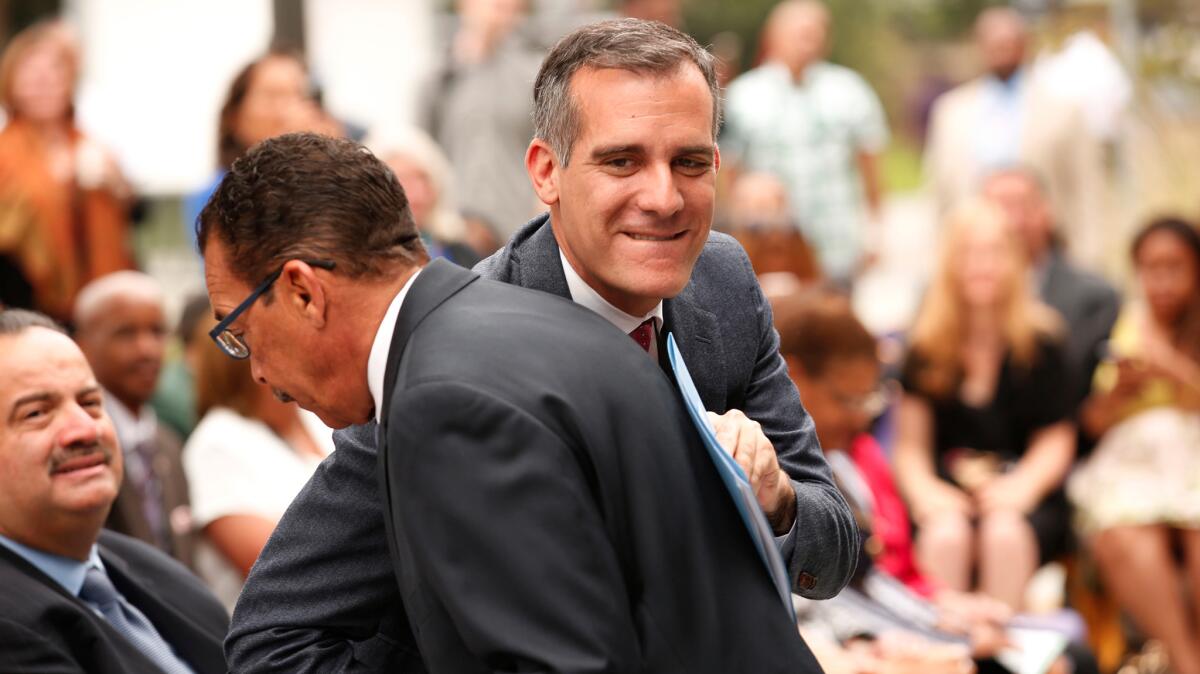Eric Garcetti wants college applications to stop asking about students’ criminal records

- Share via
Eric Garcetti has recruited 32 other mayors across the country to join him in urging college admissions companies to stop asking applicants about their criminal histories.
In a letter, the mayors petitioned the Common Application Association and Universal College Application — two companies whose standard applications are used by many private universities — “to remove any box that inquires into a person’s past criminal history from your admissions applications.”
Garcetti joins other advocates and the federal government in making the case that the mere inquiry about criminal history can scare an applicant away.
“Any box that inquires into criminal history has a strong chilling effect on applications in general,” said Kimberley Guillemet, manager of The Los Angeles Mayor’s Office of Reentry. “We know that when people see any box asking about their criminal background, a lot of them assume that they won’t have a chance to be admitted on their merits and they won’t pursue the process.”
The Common Application, which is used by schools such as Stanford and USC, already is being tweaked: In the application season beginning this fall, instead of asking applicants whether they have ever been convicted or judged guilty of a “felony, misdemeanor, or other crime,” the “other crime” option will disappear. Common App is making that change, said senior director Aba Blankson, because members found it to be ambiguous.
Blankson said her organization is asking its members to figure out how best to address the question while still satisfying their need for information.
“We appreciate getting the letter,” she said. “This is something we have been working on for several months with our members.”
Garcetti stepped into the fray in May, when U.S. Secretary of Education John B. King, Jr. held a roundtable meeting at UCLA to announce the federal government’s stance. That day, the Education Department along with the Department of Justice released “Beyond the Box,” a guide to best practices for colleges. In it was a letter urging colleges to “attract a diverse and qualified student body without creating unnecessary barriers for prospective students who have been involved with the justice system.”
Advocates cite research. Two-thirds of a sample of 2,924 people with felony convictions who started applications to the State University of New York never finished them, a 2015 study by the Center for Community Alternatives found. According to federal data, 66% of colleges collect information on criminal history from all prospective applicants.
While King has conceded that research on the effects of these questions is limited, he cited the University of California as an exemplar. The school system has never asked for information related to applicants’ criminal backgrounds — but once students are admitted, specific campuses can choose to ask for it on housing application forms.
At the May forum, Garcetti challenged L.A.’s universities to be more sensitive about asking students about their criminal backgrounds. In June, he convened the Access to Higher Education Challenge at USC to get schools talking about it.
The universities came out of that session, Guillemet said, with “a lot of enthusiasm.” Though none of them announced concrete proposals, she said the meeting gave schools a sense that they’re not alone in considering making changes.
The letter came about, she said, following the USC meeting. Shortly afterward, Garcetti attended the U.S. Conference of Mayors and asked for their support. The 32 co-signers of Garcetti’s letter hail from such cities as New York, Santa Fe, Seattle, Sacramento, Little Rock and Austin.
Garcetti, Guillemet said, doesn’t take an official position on whether or when colleges should ask applicants about their criminal backgrounds past the initial application.
“We do definitely respect the processes that … [colleges] have in place for admissions,” she said. “We just know having it at the initial application process in the time when a person is trying to put forward their best selves has caused very qualified and engaged applicants to disengage.”
ALSO
Obama administration has forgiven $171 million owed by former Corinthian students
Activists reveal more dark-money donors to campaigns against unions and schools-funding tax
More to Read
Sign up for Essential California
The most important California stories and recommendations in your inbox every morning.
You may occasionally receive promotional content from the Los Angeles Times.











